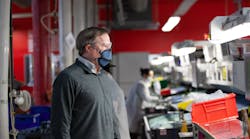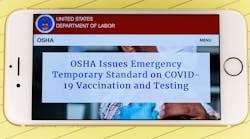Restarting the economy and business operations requires more than just reopening store doors.
“While we would all like to believe we can go back to the way things were and resume ‘business as usual,’ it’s not that simple,” said Jim Tompkins, chairman of Tompkins International.
“The COVID-19 pandemic has fundamentally changed life as we know it, and businesses—and the government—need to be prepared for what will become the ‘next normal.’”
To help businesses navigate the new reality, the company has released a new playbook, “Restarting the Economy: Guidance for Public and Private Leaders.”
The report is based on Tompkins’ assessment, broken into six points, that he has been discussing with both public and private leaders.
They are as follows:
1. Governments, with the guidance of health experts, closed the economy by issuing stay-at-home orders. But governments, with the guidance of health experts, lifting their stay-at-home orders does not open the economy nor return business to “normal.”
To reopen the economy:
a. Business supply chains must restore the synchronization of supply and demand
b. Consumers must be willing to dismiss their personal stay-at-home orders.
c. The economy must adapt to what will evolve over time as the “next normal.”
d. The reality of the next normal as per the award-winning Japanese author Haruki Murakami: “And once the storm is over, you won’t remember how you made it through, how you managed to survive. You won’t even be sure whether the storm is really over. But one thing is certain: when you come out of the storm, you won’t be the same person who walked in. That’s what this storm is all about.”
2. For the last three years, disruptions to business via digital innovations have occurred at an ever-increasing rapid rate. For the last two months, the black swan disruption to business from the coronavirus has resulted in the momentous slowing of the U.S. $22 trillion economy.
3. The reality of business leadership today is best explained by the 1987 U.S. Army War College coined term VUCA. VUCA was created to help the government deal with the heightened levels of volatility, uncertainty, complexity and ambiguity resulting from the end of the Cold War.
4. March and April 2020 have exhibited an unprecedented level of VUCA for the U.S. and global economy. Reopening the U.S. economy must be done business by business.
a. The first step requires disciplined triage to determine which businesses should be saved, paused, or closed.
b. Once it is decided a company should be saved, VUCA 2.0 (Vision, Understanding, Courage and Adaptability) must be pursued.
c. VUCA 2.0 will be different for each firm and must be deployed rapidly.
5. Confusing the governments’ lifting of their stay-at-home orders with the reopening of the economy will result in further VUCA and damage to the U.S. economy. As Vice President Pence said on Sunday, April 19, “The Trump administration wants to be sure that the coronavirus cure isn’t worse than the disease.”
6. We all need to focus our attention on restarting the economy to place the evil of COVID-19 in our rear-view mirror.



